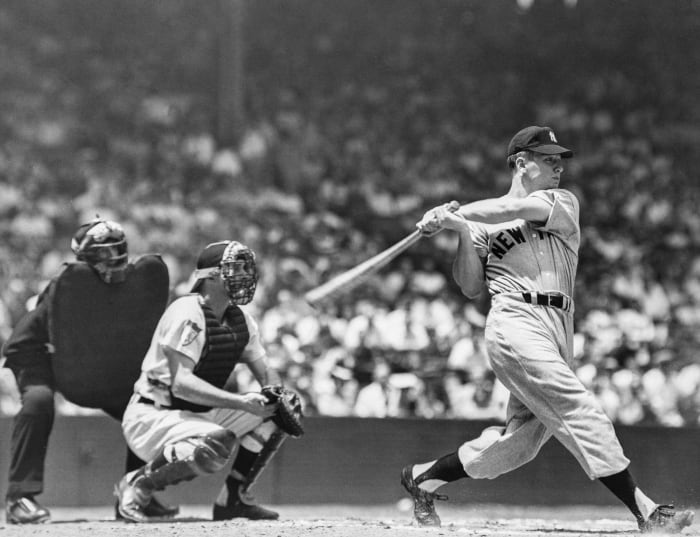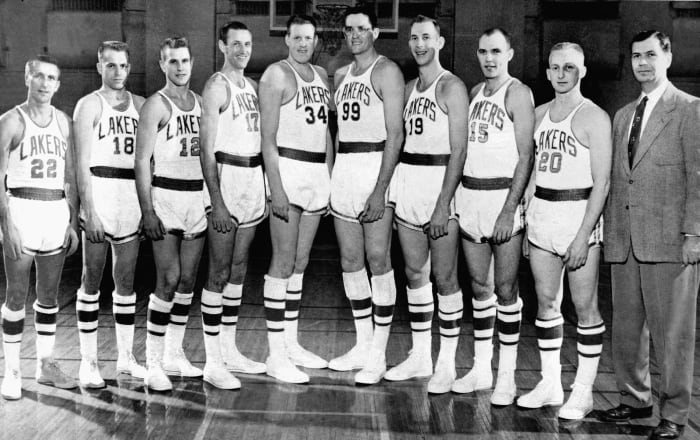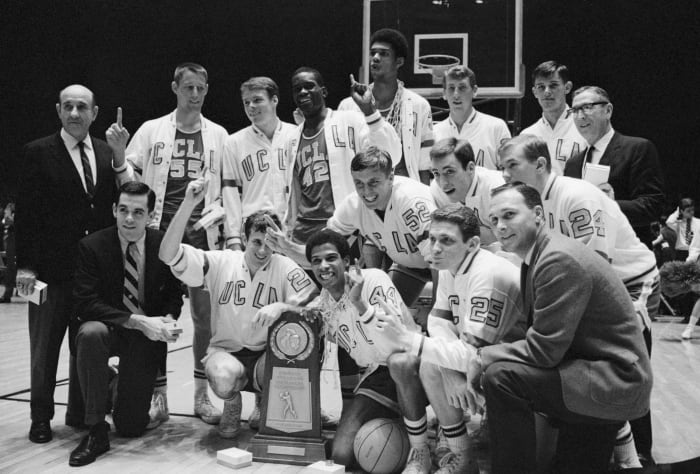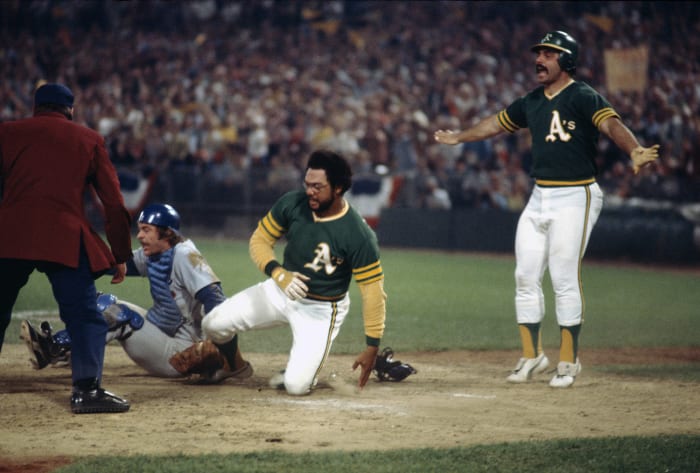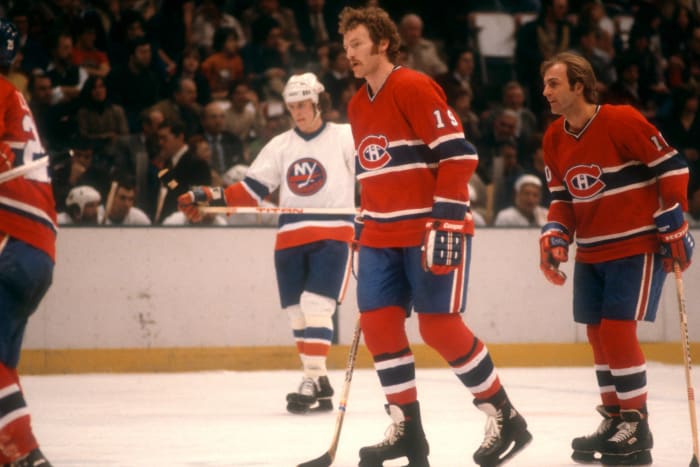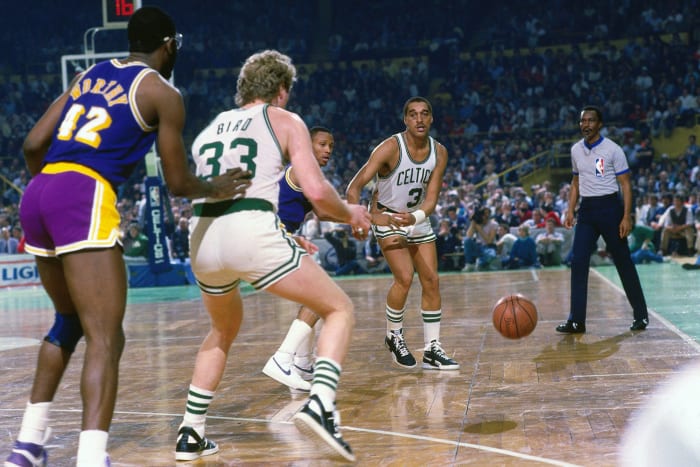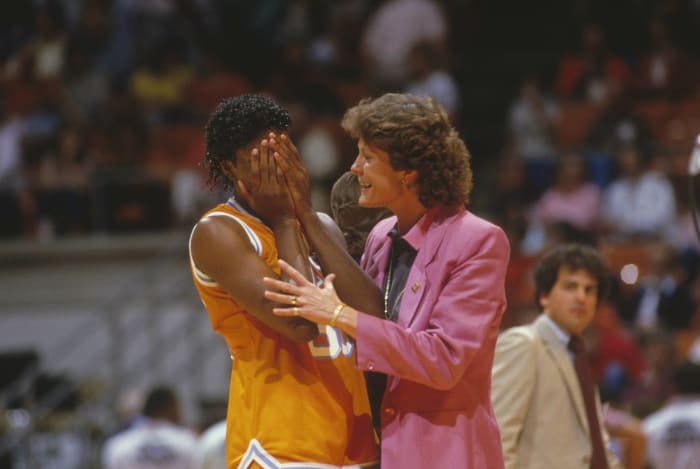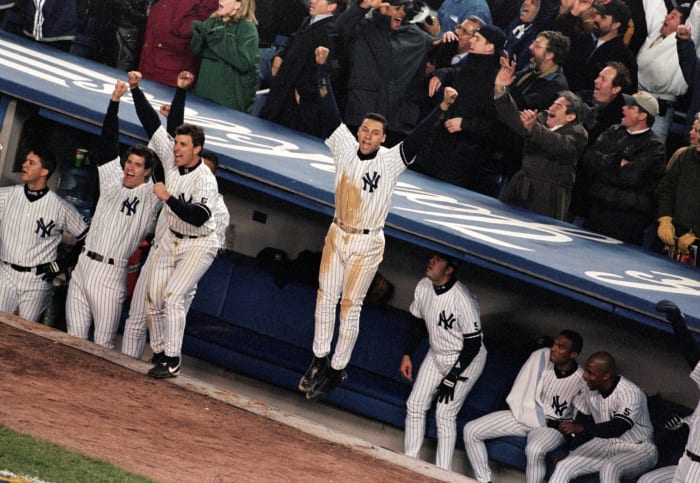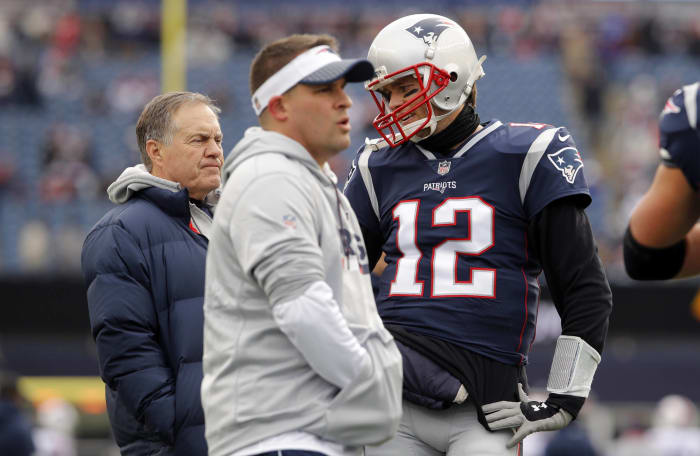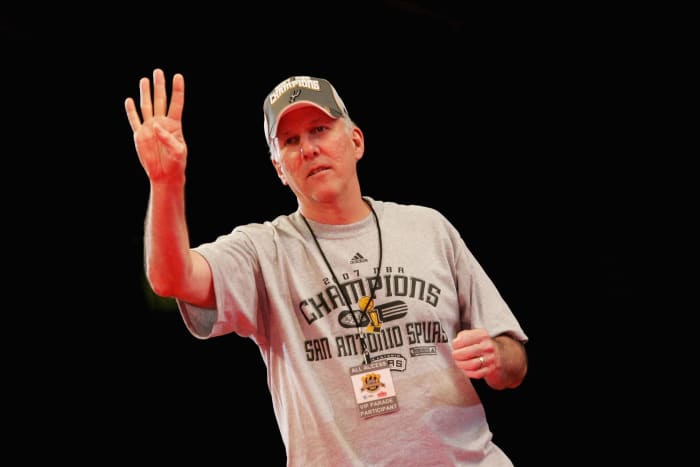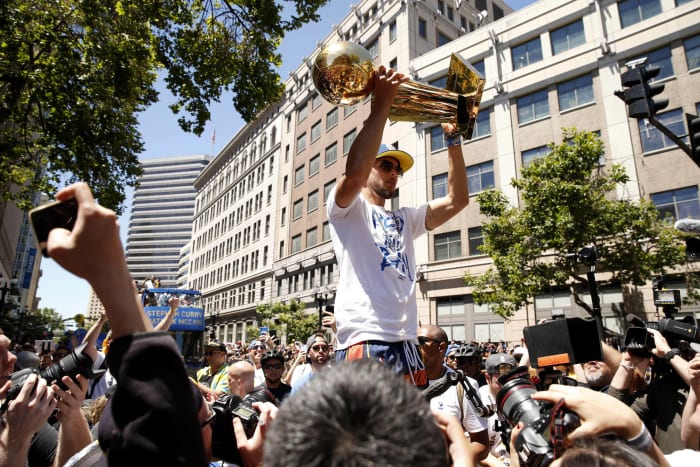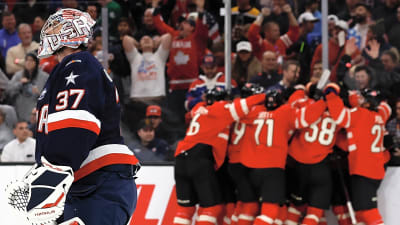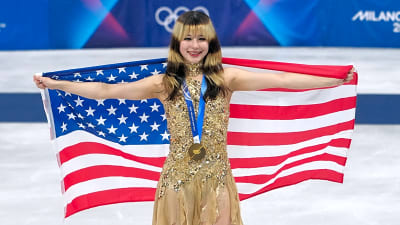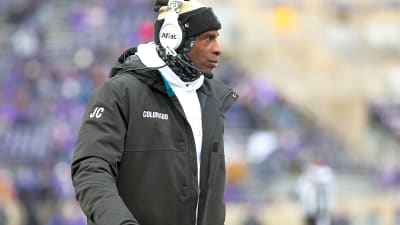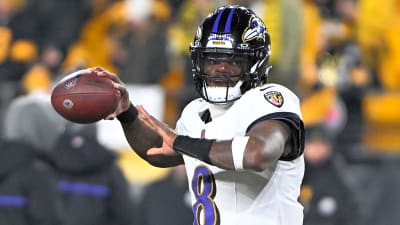Most sports fans say they want parity, especially if their favorite team has been struggling for a long time. However, the best sports teams capture the imagination and attention of sports fans like nothing else. People either love them or hate them, root hard for them to add to their legacies or cheer wildly for massive upsets.
With that in mind, let's take a look at the top 25 greatest dynasties across all sports throughout history. Oh, and as far as dynastic criteria, the baseline is at least three titles in a span of no more than five years, and heck, let's set a nice, arbitrary cutoff year of 1950, just to have some limits.
1 of 25
New York Yankees, 1950-1958
Stanley Weston/Getty Images
If you fudge the 1950 deadline and include New York's 1949 World Series crown, the Yankees went on a run that saw them win the Fall Classic seven times in 10 seasons. Paced by Mickey Mantle and Yogi Berra, as well as a pitching staff anchored by Whitey Ford, the Bronx Bombers not only won those seven titles, but also were defeated in Game 7 of the World Series in 1955 and 1957. Oh, and the one year they didn't make the playoffs, 1954, they still went 103-51, only to fall victim to the Cleveland Indians' 111-43 campaign. If you thought New York's success annoyed you now, imagine what it must have been like for Yankees-haters back then.
2 of 25
Minneapolis Lakers, 1950-1954
NBA Photos Library/NBAE via Getty Images
Most of the dynasties listed here are name brands. You recognize them, and perhaps you saw many of them with your own eyes or read extensively about them. George Mikan's Minneapolis Lakers were comparatively anonymous. They won the first NBA title in 1950, bowed out before the Finals the following season, then won three more championships in a row. Mikan was the dominant force in the league, yet retired relatively early due to injuries at the end of the 1955-56 season. However, by then the Lakers had established themselves as the league's first dynasty — a title that they would not maintain for long, however.
3 of 25
Boston Celtics, 1956-1969
D. Raphael/NBAE via Getty Images
Sheer dominance. Boston's run from the mid-1950s all the way until the end of the next decade is so absurd it's almost not believable. But it happened, and the Celtics were every bit as great as their run of championships indicated. Bill Russell was the common thread uniting a run that saw Boston win eight straight titles and 11 of 13, the last two with Russell as a player-coach, but there were plenty of other stars. Sam Jones and John Havlicek were the other major players, and Boston's balance and legendary teamwork — coupled with Red Auerbach's team-building brilliance — simply overwhelmed most opponents. It is virtually impossible to imagine any run remotely like this in modern professional sports.
4 of 25
UCLA Men's Basketball, 1963-1975
Bettmann/Getty Images
It wasn't pro sports, so one reckons that an asterisk might apply (for that and other reasons), but this is still the dynasty by which all others, save the one detailed immediately prior to this, are measured. To say that John Wooden's Bruins were dominant would be a gross understatement. Starting with the 1963-64 season and running all the way until the 1974-75 campaign, UCLA won 10 of 12 national titles, including seven in a row, and also managed to fashion an NCAA men's basketball record 88-game winning streak. It could have been even better, as well. The Bruins lost to eventual National Champion North Carolina State in the national semifinal of the 1974 NCAA Tournament. Aside from one off year in 1965-66, UCLA was virtually unbeatable. Just, uh, don't mention the name Sam Gilbert to Bruins fans.
5 of 25
Oakland Athletics, 1972-1974
Focus on Sport/Getty Images
The A's had themselves a nice time in the mid-1970s, winning three consecutive World Series and doing so with a robust cast of characters. There was, of course, Reggie Jackson, who won the 1973 AL MVP Award, plus the underrated Joe Rudi in left field and a pitching staff anchored by Catfish Hunter, Ken Holtzman and Vida Blue, with Rollie Fingers coming out of the bullpen. The A's, for whatever reason, aren't remembered as fondly as the Big Red Machine of the 1970s, but they were every bit as good — or better.
6 of 25
Pittsburgh Steelers, 1974-1979
Focus on Sport/Getty Images
The "Steel Curtain" was the defining force of the NFL in the 1970s. Bolstered by astoundingly good drafts, the Steelers rose from an also-ran in the 1960s to become the NFL's best and most fearsome team by the mid-1970s. Joe Greene, Jack Lambert, Jack Ham and Mel Blount were the anchors of a defense loaded with future Hall of Famers, and Franco Harris, Terry Bradshaw, Lynn Swann and John Stallworth were the engines of an offense that always seemed to play its best in big games. While the '70s Steelers had many worthy adversaries, no team could match their four Super Bowl wins in a six-year span.
7 of 25
Montreal Canadiens, 1975-1979
Bruce Bennett Studios/Getty Images
The Canadiens dominated the league during the Original Six days, but expansion didn't slow them down at all. Scotty Bowman's players were unfathomably dominant in all four seasons, posting what is still an NHL best 132 points during an astonishing 1976-77 campaign that saw them post a 60-8-12 record. Yes, you're reading that right. Additionally, Montreal was pushed to a seventh game precisely one time in four playoff runs, by Boston in 1978-79. Many observers consider the mid- to late-'70s Canadiens to be the single greatest dynasty in modern hockey history.
8 of 25
New York Islanders, 1979-1983
Bruce Bennett Studios/Getty Images
If dynasties are good, then one team kicking off its own run of greatness immediately after the end of a different dynasty is even better. The Islanders picked up the torch after Montreal was ousted by the Minnesota North Stars in the 1979 playoffs and followed Montreal's four-peat with one of their own. Led by Mike Bossy, Bryan Trottier, Denis Potvin and Clark Gillies, and featuring the stellar goaltending of Billy Smith, Al Arbour's Isles were an unstoppable force, only meeting their match when running into Edmonton while gunning for a fifth straight Stanley Cup, which would have been a record for the expansion era.
9 of 25
Boston Celtics, 1980-1986
D. Raphael/NBAE via Getty Images
We're breaking the "three titles in five years" minimum requirement here but for good reason. The Celtics made the NBA Finals four straight years from 1984-85 to 1987-88, winning twice, and both losses came to the Lakers. The two teams defined the NBA of the 1980s, and the personal rivalry between Larry Bird and Magic Johnson saved the league and started it on the path to the extremely healthy entity it is today. Boston's 1980-81 title deserves some recognition here, and overall the '80s saw Boston have its greatest success since the Bill Russell era.
10 of 25
Edmonton Oilers, 1983-1990
B Bennett/Getty Images
If you believe that the best sports teams are largely good for leagues, then the NHL had its greatest bonanza from the mid-1970s right up until 1990. That's because, with few exceptions, the champion each year was almost certain to be the Canadiens, Islanders or Oilers. Edmonton took the mantle of hockey's best from the Islanders starting in the 1983-84 season, just like the Islanders had taken it from Montreal before that. Edmonton had Wayne Gretzky, of course, but also Paul Coffey, Mark Messier, Jari Kurri and Grant Fuhr in goal. With that kind of talent on hand, it's not at all surprising that the Oilers won five Stanley Cups in a seven-year stretch.
11 of 25
Los Angeles Lakers, 1984-1988
Focus on Sport/Getty Images
The Showtime Lakers were the the perfect foil for the rugged Boston Celtics. It wasn't just that the personality of the teams and cities they represented made for the perfect rivalry — it was the fact that both squads were brimming with talent that really made things great. The 1980s Lakers were a collection of one-name talents — Magic, Kareem and Worthy — and had a great supporting cast in the form of Byron Scott, Michael Cooper, Mychal Thompson and, for the last two titles, A.C. Green. But for a loss to the Houston Rockets in the 1986 playoffs, the Lakers would have had a shot at Boston and, in retrospect, a chance at a four-peat.
12 of 25
San Francisco 49ers, 1984-1989
Focus on Sport/Getty Images
We're bending the dynasty rules yet again, but again it is for a good reason. If the Steelers were the greatest team of the 1970s, then the 49ers were the greatest team of the 1980s. Bill Walsh's offense revolutionized the NFL — among other things making the left tackle a vitally important position — and starting to slowly shift the offensive focus from running to passing. Joe Montana was Tom Brady before Brady was Brady, and Jerry Rice was as dominant an individual talent as there was in the sport. Though the 49ers went three seasons without a Super Bowl in the midst of this run, their three championships in six years — and four in nine, if you count 1981's title — deserve plenty of credit.
13 of 25
Tennessee Women's Basketball, 1986-1991
Focus on Sport/Getty Images
This was Pat Summitt's first dynasty at Tennessee and the one that put the Lady Vols on the map as the first truly dominant program in women's college hoops. Tennessee won titles in 1987, 1989 and 1991 and established Summitt as the biggest and best name in the sport. While those Tennessee teams don't get as much publicity as more recent ones, standouts Daedra Charles and Bridgette Gordon belong on the short list of the greatest players to ever come through Knoxville.
14 of 25
Chicago Bulls, 1990-1998
Andrew D. Bernstein/NBAE via Getty Images
Ask just about any American sports fan between the ages of 30 and 40 what their favorite dynasty was growing up, and chances are they'll say the 1990s Chicago Bulls. The Bulls were the defining team of that decade, and Michael Jordan was the best and most famous athlete on the planet. The first three-peat saw a younger, explosive Jordan finally vanquish the Detroit Pistons in 1990-91, then proceed to conquer the NBA with three straight titles. While Jordan took time off for baseball during his first retirement, the Bulls were still formidable but missing something. That something was Jordan, who came back in mid-1995 and the following year started the Bulls on a run of three more titles. It isn't unreasonable to suggest that had Jordan not stepped away, Chicago would have won eight straight championships.
15 of 25
Dallas Cowboys, 1992-1995
Focus On Sport/Getty Images
How 'bout them Cowboys? Jimmy Johnson took a moribund franchise and, along with Jerry Jones' help (come on, you don't think we'd leave Jerry out of this, do you?), turned the Cowboys into a perennial contender through a series of shrewd trades in the late-1980s. Emmitt Smith, Troy Aikman and Michael Irvin all burst onto the scene, and the Cowboys' defense, featuring talents like Russell Maryland, Jim Jeffcoat, Charles Haley and Ken Norton Jr., was equally dynamic. The Cowboys rolled over the Bills twice to win Super Bowls and finally got revenge on the Steelers, albeit two decades later, for their mastery over Dallas in the 1970s.
16 of 25
Tennessee Women's Basketball, 1995-1998
Bob Stowell/Getty Images
After losing to Connecticut in the 1995 National Championship Game, it looked like Pat Summitt's Lady Vols might have a true challenger to their supremacy. While UConn eventually took over the sport, Tennessee responded to that title game loss by ripping off three straight titles, culminating in an undefeated 1997-98 season. Paced by a big three of Chamique Holdsclaw, Tamika Catchings and Semeka Randall, known as the "Three Meeks," Tennessee won all but one of its NCAA Tournament games by at least 18 points and did not have a single one-possession game all season long.
17 of 25
New York Yankees, 1996-2000
Jamie Squire/Getty Images
An argument can be made that the Yankees are both the most famous and celebrated franchise in North American sports. Their 27 World Series titles are far and away the most in Major League Baseball history and exceed even Montreal's 23 Stanley Cups to top all teams in the four "major" sports. These Yankees broke a long drought with their 1996 title, led by Derek Jeter, Tino Martinez, Paul O'Neill and Bernie Williams on the field and Andy Pettitte, Mariano Rivera and John Wetteland in the bullpen. The 1998 and 1999 teams were juggernauts, especially 1998, when the Yanks posted an astonishing 114-48 mark and lost only twice in the entire playoffs.
18 of 25
Los Angeles Lakers, 1999-2002
Henny Abrams/Getty Images
Shaq. Kobe. Phil. Nothing more needs to be said, really. This trio helped the Lakers to their greatest run of success post-Showtime Era and did so in style, typically dominating their NBA Finals opponents three straight years. O'Neal was at the height of his powers at this point, and Bryant was blossoming into the best pure scoring guard in the league. Their talents, plus Jackson's coaching and a versatile cast of role players, proved nearly impossible to surmount, though the Portland Trail Blazers and Sacramento Kings came close.
19 of 25
UConn Women's Basketball, 1999-2004
Elsa/Getty Images
This would qualify as the first dynasty Geno Auriemma built in Storrs. Starting with the 1999-2000 team, the Huskies won four titles in five years, three times besting archrival Tennessee in the National Championship Game. The 2001-02 team was the pinnacle of this five-year run, going 39-0 and featuring a who's who of all-world talent, including Sue Bird, Swin Cash, Diana Taurasi, Asjha Jones and Tamika Williams. Though Tennessee would continue to be a threat and win two more titles under Pat Summitt, it was this stretch that solidified UConn as the pre-eminent power in women's college basketball.
20 of 25
New England Patriots, 2001-2004
David Butler II-USA TODAY Sports
Surprised that the Pats only met the fairly rigid "three titles in five years" minimum criteria? I can understand if you are. It only feels like New England wins the Super Bowl every year. Interestingly, these three title teams didn't cut the fearsome profile that the present-day Patriots do — they were more resourceful and got by with great defense and clutch, but not infallible, play from Tom Brady. Aside from a mediocre 9-7 mark in 2002, the Pats were a model of efficiency, always finding a way to outlast the competition and twice denying the Pittsburgh Steelers in the AFC Championship Game. They've arguably had better teams top to bottom in the years since, but New England has never had a four-year run better than this one.
21 of 25
San Antonio Spurs, 2002-2007
Chris Birck/Getty Images
The Shaq and Kobe Lakers of the early 2000s had a very real chance at a four-peat, but they were stopped dead in their tracks by the Spurs, who soundly beat them in the Western Conference semis on their way to an NBA title. It was the first of three championships in a five-year span for Gregg Popovich, Tim Duncan and company. If the Lakers were modern-day "Showtime" glitz, plus all the accompanying drama, the Spurs were a model of ruthless efficiency, slicing through opponents with a disciplined, defense-focused approach. The final title of San Antonio's five-year run may have been the most impressive, as the Spurs swept LeBron James and the upstart Cavaliers, holding Cleveland under 80 points in two of the four games.
22 of 25
UConn Women's Basketball, 2008-2016
Chris Graythen/Getty Images
It might seem like Geno Auriemma's Huskies have been dominant since forever, but as good as they've been for two-plus decades, six of Auriemma's 11 career National Championships came between 2008 and 2016. Starting with the 2008-09 season, the UConn women won six of eight national titles, finished unbeaten four separate times and put together a staggering 111-game winning streak that stretched from 2014 to 2017, one that saw the Huskies win by fewer than 10 points only three times. Oh, and Breanna Stewart became the first player in men's or women's college basketball to win four national titles and be Most Outstanding Player of the Final Four all four years. Not bad, you might say.
23 of 25
San Francisco Giants, 2010-2014
Gary A. Vasquez-USA TODAY Sports
The Giants, of all the teams on this list, probably cut the least intimidating profile. They won the World Series in 2010, 2012 and 2014. However, odd-numbered years were not kind to them, as they missed the playoffs completely in 2011, 2013 and 2015. Still, no team was more resilient or clutch once they got to the postseason than the Giants. Whether it was Edgar Renteria in 2010, Pablo Sandoval in 2012 or Madison Bumgarner's almost unfathomable 2014 performance, someone always stepped up in a big way when the lights were brightest. Come to think of it, it's an even-numbered year, and the Giants, as of this writing, are 45-41 and lurking in the playoff chase. They couldn't do it again, could they?
24 of 25
Alabama Football, 2009-present
Marvin Gentry-USA TODAY Sports
Nick Saban's first season as Alabama head coach was 2007. That year, he led the Crimson Tide to a 7-6 record. Since then, Alabama has won at least 12 games in all but three seasons, and those "down" years were 10- and 11-win campaigns, respectively. Saban's teams have won four national titles in the 2010s and are so overwhelming that even when they don't win it all, many observers feel they are still the nation's best team. Saban is without peer on the recruiting trail, and his stranglehold over the sport is such that the Crimson Tide will continue to be at worst a preseason co-favorite for every championship for as long as he remains the coach.
25 of 25
Golden State Warriors, 2014-2019
Cary Edmondson-USA TODAY Sports
It isn't just that Golden State has won three of the last six NBA titles — it's that the Warriors have done so in utterly dominant fashion. In their three successful title runs, they are a combined 48-11 in the playoffs, including a preposterous 16-1 run in 2016-17. Were it not for the greatness of LeBron James and Kyrie Irving in 2015-16, the Warriors would have become the league's first four-peat champion since the 1960s Celtics. Steph Curry, Klay Thompson, Draymond Green and company aren't finished yet, even with James' move to Los Angeles.
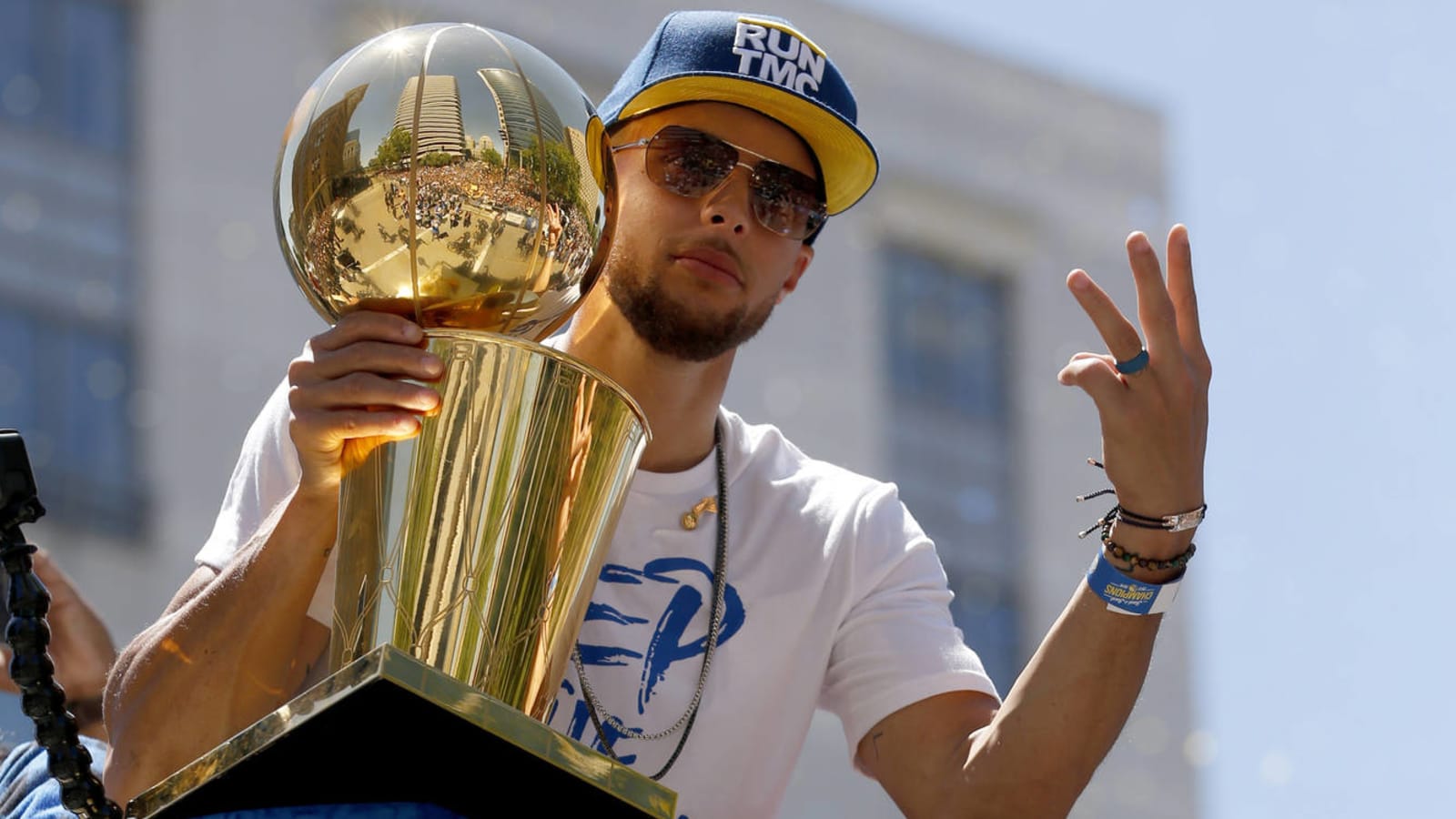
 +
+
